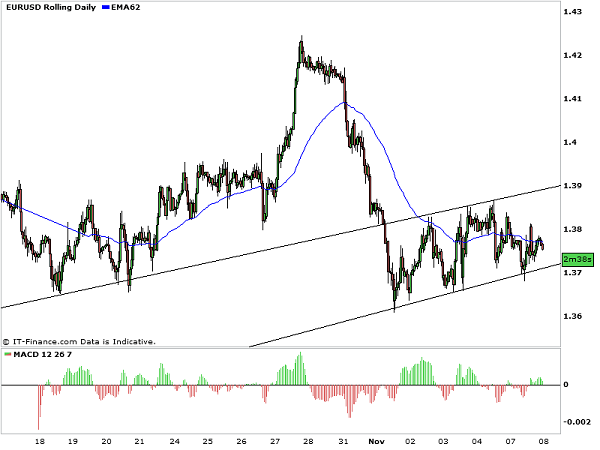The Euro project was supposed to be the most progressive and unified monetary venture ever created, spreading wealth and allowing the exchange of goods across a prosperous and strong economic region. Today’s Euro project , however, looks increasingly vulnerable in the wake of stagnating economies, sovereign debt and the potential withdrawal of some of its members. The news today that Italy is the next potential victim of a near-term default weighed heavily across all European markets, pushing the Euro lower and Italy’s bond yield up to a worrying 6.67%.

Bond yields have a tendency to rise when a government requires cash but is not necessarily guaranteed to be able to pay this back. So, far from being a natural phenomenon reflecting the actual health of a nation’s economy they instead become self-fulfilling prophecy; when bond yields rise they restrict the amount of cash and also become unsustainable to pay back for a government with no surplus finance to pay this large interest rate. The fear in Italy’s case is that it may go the same way as Greece in requiring outside intervention, and, if it hits the 7% 10-year bond threshold this will be an automatic assumption rather than a possibility.
The Euro has reflected today’s market cynicism by moving considerably lower as a reaction to the Italian bond price and underlying fears that this has become a contagious crisis. It is no longer seen to only negatively affect the smaller economic states such as Spain, Portugal and, earlier this year, Ireland but has moved onto the third largest economy in Europe. Italy requiring outside support and the potential for it to default on its loans would be disastrous for the Euro and the Eurozone as a whole. A reflection of how contained this problem currently is could at best be seen last week with US banks being largely unaffected by the large declines in European banking shares whilst today the Dow Jones ended the day slightly higher despite the grim news from Europe.
It is true that markets jumped higher and regained some ground on Monday with the news that Silvio Berlusconi may not survive the key vote on the country’s public finances scheduled for Tuesday. This reaction is perhaps a little hopeful in the belief that simply changing a political figurehead, however inept, will create a magic bullet for economic reform to the degree needed to lift Italy out of the mire. In the case of Greece, the formation of a coalition may have paved the way for a further tranche of bailout funds but the underlying structural reforms required will take both time and resources.
The euro is looking particularly weak between its short term rallies on glimmers of news. If there can be some consensus reached on the expansion of the European Financial Stability Facility (EFSF) bailout fund then there is the possibility that it may find some support; however this has not yet been confirmed. With continued uncertainty the charts appear to have stalled somewhat but a move lower is both probable and expected.
Comments (No)